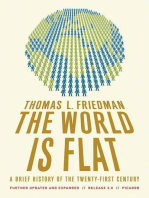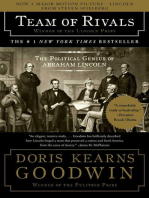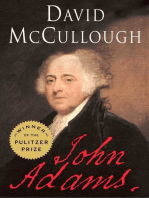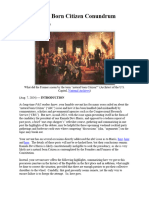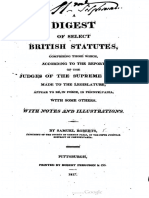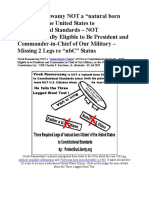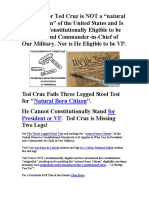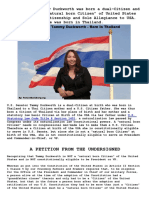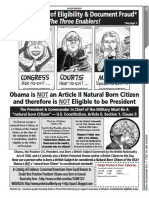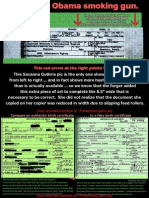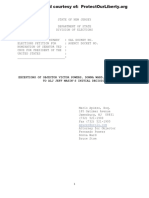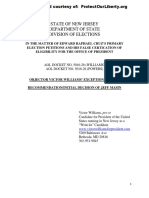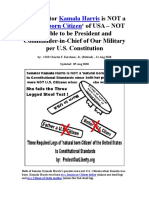100%(1)100% found this document useful (1 vote)
352 viewsUS Allegiance Institute Amicus Curiae Brief Filing by Atty Olson & Atty Apuzzo Re Laity V Harris Lawsuit
US Allegiance Institute Amicus Curiae Brief Filing by Atty Olson & Atty Apuzzo Re Laity V Harris Lawsuit
Uploaded by
protectourlibertyUploaded 21 Dec 2020: Re. Natural born Citizen. U.S. Allegiance Institute Amicus Curiae Brief filing by Attorney William J. Olson & Attorney Mario Apuzzo re Laity v Harris federal lawsuit. A tour de force re the difference between a 14th Amendment "Citizen" of the United States vs an Article II "natural born Citizen" of the United States. For more information on the subject of "natural born Citizen" see http://www.ProtectOurLiberty.org CDR Charles F. Kerchner, Jr., (Retired)
Copyright:
© All Rights Reserved
Available Formats
Download as PDF or read online from Scribd
US Allegiance Institute Amicus Curiae Brief Filing by Atty Olson & Atty Apuzzo Re Laity V Harris Lawsuit
US Allegiance Institute Amicus Curiae Brief Filing by Atty Olson & Atty Apuzzo Re Laity V Harris Lawsuit
Uploaded by
protectourliberty100%(1)100% found this document useful (1 vote)
352 views34 pagesUploaded 21 Dec 2020: Re. Natural born Citizen. U.S. Allegiance Institute Amicus Curiae Brief filing by Attorney William J. Olson & Attorney Mario Apuzzo re Laity v Harris federal lawsuit. A tour de force re the difference between a 14th Amendment "Citizen" of the United States vs an Article II "natural born Citizen" of the United States. For more information on the subject of "natural born Citizen" see http://www.ProtectOurLiberty.org CDR Charles F. Kerchner, Jr., (Retired)
Original Title
US Allegiance Institute Amicus Curiae Brief filing by Atty Olson & Atty Apuzzo re Laity v Harris Lawsuit
Copyright
© © All Rights Reserved
Available Formats
PDF or read online from Scribd
Share this document
Did you find this document useful?
Is this content inappropriate?
Uploaded 21 Dec 2020: Re. Natural born Citizen. U.S. Allegiance Institute Amicus Curiae Brief filing by Attorney William J. Olson & Attorney Mario Apuzzo re Laity v Harris federal lawsuit. A tour de force re the difference between a 14th Amendment "Citizen" of the United States vs an Article II "natural born Citizen" of the United States. For more information on the subject of "natural born Citizen" see http://www.ProtectOurLiberty.org CDR Charles F. Kerchner, Jr., (Retired)
Copyright:
© All Rights Reserved
Available Formats
Download as PDF or read online from Scribd
Download as pdf
100%(1)100% found this document useful (1 vote)
352 views34 pagesUS Allegiance Institute Amicus Curiae Brief Filing by Atty Olson & Atty Apuzzo Re Laity V Harris Lawsuit
US Allegiance Institute Amicus Curiae Brief Filing by Atty Olson & Atty Apuzzo Re Laity V Harris Lawsuit
Uploaded by
protectourlibertyUploaded 21 Dec 2020: Re. Natural born Citizen. U.S. Allegiance Institute Amicus Curiae Brief filing by Attorney William J. Olson & Attorney Mario Apuzzo re Laity v Harris federal lawsuit. A tour de force re the difference between a 14th Amendment "Citizen" of the United States vs an Article II "natural born Citizen" of the United States. For more information on the subject of "natural born Citizen" see http://www.ProtectOurLiberty.org CDR Charles F. Kerchner, Jr., (Retired)
Copyright:
© All Rights Reserved
Available Formats
Download as PDF or read online from Scribd
Download as pdf
You are on page 1of 34
IN THE UNITED STATES DISTRICT COURT
FOR THE DISTRICT OF COLUMBIA
ROBERT C. LAITY,
Plaintiff,
Case No. 20-cv-2511-EGS
v.
KAMALA DEVI HARRIS
Defendant.
eS |
MOTION OF
U.S. ALLEGIANCE INSTITUTE
FOR LEAVE TO FILE BRIEF AMICUS CURIAE
IN OPPOSITION TO DEFENDANT’S MOTION TO DISMISS
‘On the grounds and for the reasons set forth below, movant, through undersigned
counsel, pursuant to F.R.Ciy.P. 7 and Rule 7(0) of the local rules of this Court, move this
Court for leave to file a brief amicus curiae in opposition to Defendant's Motion to Dismiss.
Counsel for Plaintiff consented to this Motion and to the filing of the attached brief
amicus curiae. Counsel for Defendant has not yet responded.
This brief is being filed timely within seven days of the Plaintiff's Opposition to the
‘Motion to Dismiss, the same amount of time allowed for an amicus curiae brief under the
Federal Rules of Appellate Procedure, F.R.App.P. Rule 29(a)(6), and will not unduly delay
this Court's ability to rule on the motion to dismiss.
‘Movant U.S. Allegiance Institute is exempt from federal income taxation under Section
501(c)(3) of the Internal Revenue Code (“IRC”). The organization participates actively in the
public policy process. Movant defends U.S. citizens’ rights against government overreach,
2
and support the proper interpretation of the United States Constitution as the charter for our
Nation, Its website is at www usallegianceinstitute.org. Movant has a particular concern that
the qualifications for President and Vice President set out in Article IT of the U.S. Constitution
should be followed, and has performed significant research into the meaning of the Natural
Born Citizen Clause that has not been presented to this court.
I. THIS CASE PRESENTS A CONSTITUTIONAL MATTER OF GREAT
IMPORTANCE.
Article II of the U.S. Constitution specifies the qualifications for an individual to serve
as President of the United States, and the Twelfth Amendment also imposes the same
qualifications on the Vice President.
‘Movant believes that this Court has a duty to give effect to the requirements of Article
I, to protect the integrity of the Presidency, for the reasons set out in the brief amicus curiae.
I. THE AMICUS CURIAE BRIEF RAISES RELEVANT ISSUES NOT ADDRESSED
ADEQUATELY IN THE PLAINTIFF'S OPPOSITION.
The movant’s amicus curiae brief submitted with this Motion supports the position of
Plaintiff. However, the amicus curiae brief provides relevant history and makes arguments
that are not fully developed by Plaintiff’s Opposition to the Motion to Dismiss.
This amicus brief does not address the standing issue, but should this Court rule on the
merits, it needs to have before a more complete presentation of the issues than the pro se
plaintiff was able to provide. Moreover, this amicus brief explains why the basic contention of
the defendant — that the Fourteenth Amendment defines a natural born citizen — is completely
erroneous and explains exactly why the Fourteenth Amendment did not alter the common law
meaning of the Natural Born Citizen Clause,
3
Il. THE ACCEPTANCE OF BRIEFS AMICUS CURIAE HAS BEEN FOUND
USEFUL IN CASES SUCH AS THIS.
District courts have inherent power to grant leave to file briefs amicus curiae, as they
often “provide helpful analysis of the law,] they have a special interest in the subject matter of
the suit{,] or existing counsel is in need of assistance.” Bryant v. Better Business Bureau of
Greater Maryland, Inc., 923 F.Supp. 720, 728 (D. Md. 1996). See also Independence
Institute v. FEC, Minute Order of June 28, 2016 granting motion for leave to file Brief Amicus
Curiae, Docket No. 1:14-ev-01500 (D.D.C. 2016).
For the reasons stated above, it is believed, particularly in bringing to the attention of
the Court important principles and binding authorities not fully addressed by the parties, that
this amicus brief will inform the Court's effort to resolve the question before it.
Given the nationwide significance of this case, and its profound implications for all
Americans, movant respectfully requests leave to file the accompanying brief amicus curiae in
opposition to Defendant's Motion to Dismiss.
Respectfully submitted,
/s William J. Olson Mario Apuzzo* (NJ Bar No. 030611982)
William J. Olson (D.C. Bar No. 233833) 185 Gatzmer Avenue
Jeremiah L. Morgan (D.C. Bar No. 1012943) Jamesburg, New Jersey 08831
William J. Olson, P.C. (732) $21-1900
370 Maple Avenue West, Suite 4 apuzzo@erols.com
Vienna, Virginia 22180-5615 *pro hac vice motion forthcoming
(703) 356-5070
wjo@mindspring.com
Dated: November 9, 2020 Counsel for Amicus Curiae
U.S. Allegiance Institute
Case 1:20-cv-02511-EGS Document 12-1 Filed 11/10/20 Page 1 of 31
IN THE UNITED STATES DISTRICT COURT,
FOR THE DISTRICT OF COLUMBIA
ROBERT C. LAITY,
Plaintiff,
Case No. 20-cv-2511-EGS
v.
KAMALA DEVI HARRIS
Defendant.
BRIEF AMICUS CURIAE OF
U.S. ALLEGIANCE INSTITUTE
IN OPPOSITION TO DEFENDANT'S MOTION TO DISMI
/s William J. Olson Mario Apuzzo* (NJ Bar No. 030611982)
William J. Olson (D.C. Bar No. 233833) 185 Gatzmer Avenue
Jeremiah L. Morgan (D.C. Bar No. 1012943) Jamesburg, New Jersey 08831
William J. Olson, P.C. (732) 521-1900
370 Maple Avenue West, Suite 4 apuzzo@erol
Vienna, Virginia 22180-5615 *pro hac vice motion forthcoming
(703) 356-5070
wjo@mindspring.com
Dated: November 9, 2020 Counsel for Amicus Curiae
U.S. Allegiance Institute
Case 1:20-cv-02511-EGS Document 12-1 Filed 11/10/20 Page 2 of 31
TABLE OF CONTENTS
Page
TABLE OF AUTHORITIES ii
INTEREST OF U.S. ALLEGIANCE INSTITUTE. 0.000000 00 000000000000 e eee eee ee ee eeeeenes 1
SUMMARY OF ARGUMENT 1
ARGUMENT
1 The Original Public Meaning of “Natural Bom Citizen” ..........00 0000 000c cece 2
A. Textual Analysis 2
B. Purpose for the Natural Born Citizen Clause ..0.0.0000 00 cccveveeeeeeeees 4
C. Historical Evidence. ....... 2... 060000. c cece cece e eee eens 6
1, Natural Born Subjects in Great Britain. .
2. The Framers Looked To The Law Of Nations And Emer De Vattel
And Not The English Common Law For Their Definition Of A
“Natural Born Citizen” 7
3. David Ramsay... eect eee cece u
4. St. George Tucker... 2.6... eects 12
5. James Wilson .. “13
6. Nathan Dane... 2.2... 6.60 eee eee eee eee eee 14
7. The Naturalization Acts Of Congress 14
I. Developments Surrounding the Fourteenth Amendment Did Not Change the
‘Meaning of Natural Born Citizen... 0.02.0. .00 00 ceceeceeeeeeeeeeeeeeee ees 16
A. Civil Rights Act 0f 1866... 0000000000 ccceceeeeeeeeeeteeeeeeteeeeee 16
B. The Fourteenth Amendment 17
Il Kamala Devi Harris Is Not a Natural Bom Citizen... 000000 ee cece eeeeeeee 25
CONCLUSION . .
Case 1:20-cv-02511-EGS Document 12-1 Filed 11/10/20 Page 3 of 31
ii
TABLE OF AUTHORITIES
trict of Columbia v. Heller, 554 U.S. 570 (2008)
Dred Scott v. Sandford, 60 U.S. 393 (1857) (Daniel, J., concurting)............. 005 8,9, 16
Ex parte Reynolds, 1879, 5 Dill., 394. 9
Inglis v. Trustees of Sailors’ Snug Harbor, 28 U.S. 99 (1830)....... 0... e cece ee eeeeeeeeee 9
INS v. Rios-Pineda, 471 U.S. 444 (1985). 000... e eee eee ee eee 24
Lynch v. Clark, | Sandf. Ch. 656 (N.Y. 1844) 2
Marbury v. Madison, 5 U.S. 137 (1802)... 000000 cce sees eeeeeee ee teeeeeee en eeee 3,20
Minor v. Happersett, 88 U.S. 162 (1875) 8, passim
Plyler v. Doe, 457 U.S, 202 (1982)... 0.0. cece cece cece cece cece eee eeeeeeeeeeeeeeee 24
Robinson v. Bowen, 567 F. Supp. 2d 1144 (N.D.Cal.2008) 00.0... 00000 cec ee eeeee eee 18
Rutgers v. Waddington (1784) ul
Shanks v. Dupont, 28 U.S. 242 (1830).000000 0.0000 c cece eee c ects eee eee e eee neee 9
Sugarman v. Dougall, 413 U.S. 634 (1973) (Rehnquist, J., dissenting) 19
Seminole Tribe of Florida v. Florida, $17 U.S. 44 (1966) (J. Souter, dissenting) ........... 10
Slaughter-House Cases, 83 U.S. 36 (1873)... 0.00000 cce cece ceee eee teeeeeee 9, 21,22
Smith v. Alabama, 124 U.S. 465 (1888). 10
ye Venus, 12 U.S. (8 Cranch) 253 (1814) (Marshall, C.J., concurring) 9
Tisdale v. Obama, 2012 WL 7856823 (E.D.Va.Jan.23, 2012) 24
United States v. Ward, 42 F.320 (C.CS.D.Cal. 1890) 000.000. e eee e een eee ners ee 10
Case 1:20-cv-02511-EGS Document 12-1 Filed 11/10/20 Page 4 of 31
ii
United States v. Wong Kim Ark, 169 U.S. 649 (1898) 8, passim
FOREIGN CASES.
ilvin’s Case, 7 Coke, 1 (1608).. 0.02.00. cece veces cece eeseeeeeueeteneeseee 6.14
FEDERAL CONSTITUTION.
ULS. Const. art, Il, $0. 5 Ch bocce cece cece veces sete sete veeeneeteeete es 1, passim
‘Twelfth Amendment, U.S. Const. 2,3
Fourteenth Amendment, US. Const. 0.20.00. 0000c0 cee cece veeee sees setae e 1, passim
CONSTITUTIONAL CONVENTIONS.
Elliott’s Debates: Volume 5 Appendix to the Debates of the Federal
Convention, Note 5, Article IX Sec. | in Appendix F 6
James Madison, Notes of Debates in the Federal Convention of 1878
Reported by James Madison (1966), p. 364 5,6
2 Documentary History of the Constitution, IV, 334-336. 3 Records of the
Federal Convention of 1787, p. 129 (M. Farrand ed. 1911) 7
THE FEDERALIST PAPERS
James Madison, The Federalist No. 42 7
Alexander Hamilton, The Federal
FEDERAL STATUTES
‘The Naturalization Acts of 1790 (1 Stat. 103) 14, 16, 17
‘The Naturalization Acts of 1795 (1 Stat. 414)... 0.6... cceecseee este eeeee eee 14, 16,17
‘The Naturalization Acts of 1802 (2 Stat. 153) 14,16
‘The Naturalization Acts of 1855 (10 Stat. 604) 00.000... ccc eee eceeeeeee reer eee 14,16
Civil Rights Act of 1866..000000...0000cccceeeecveeeeeeeeccsseeeeeeecseeeeees 16
Case 1:20-cv-02511-EGS Document 12-1 Filed 11/10/20 Page 5 of 31
iv
Cable Act of 1922 (ch. 411, 42 Stat. 1021) 8
BUS.C. § 14018) oo. ieee eect ete tee e eter n ett e tere tene rene 19
STATE CASES.
Ankeny v. Governor of State of Ind., 916 N.E.2d 678 (Ind.Ct.App.2009) 24
STATE STATUTES
Political Code of the State of New York (1860). 2
OTHER AUTHORITIES.
John A. Bingham, (R-Ohio) US Congressman, March 9, 1866 Cong. Globe,
39th, Ist Sess., 1291 (1866) 00... eee eeeee ete cee ee eset teeeee tenn eeeee eens 10
1 William Blackstone, Commentaries 442 12
Black's Law Dictionary 776 (4th ed. 1968) ..
Jaques Burlamaqui (1747) oo... 060 c cece eee eee e etter ee eeeee W
Patrick J. Charles, Decoding the Fourteenth Amendment’s Citizenship
Clause: Unlawful Immigration, Allegiance, Personal Subjection, and the
Law, 51 Washburn L.J., Issue 2 (forthcoming Spring 2012) .. 0... .00000000ceevevereees 10
U.S. House Speaker Langdon Cheves (1814). u
1 Timothy Cunningham, A New and Complete Law-Dietionary, or,
General Abridgment of the Law (1783) 16
4 Nathan Dane, A General Abridgment And Digest Of American Law,
Ch. 131, art, 2, § 2-8, 698 (1824) 14, 15
Linda K. Kerber, No Constitutional Rights to be Ladies 15 (New York: Hill &
‘Wang, 1998) 8
Andrew C. Lenner, The Federal Principle in American Politics, 1790-1833 (2001) 10
John Locke (1689) ul
Pastor Alexander McLeod (1815)... 06... 00ee00eeeeeeee sees eee eeeeeeeeeneee eee u
Case 1:20-cv-02511-EGS Document 12-1 Filed 11/10/20 Page 6 of 31
Samuel von Pufendorf (1691)
David Ramsay, A Dissertation on the Manners of Acquiring the Character
and Privileges of a Citizen (1789)
St. George Tucker, Blackstone's Commentaries: with Notes of Reference
to the Constitution and Laws of the Federal Government of the
United States and of The Commonwealth of Virginia (1803)
E, de Vattel, The Law of Nations,
(Ist ed. Neuchatel 1758)
bk. 1, ¢. 19, see. 212 (London 1797)
E. de Vattel, The Law of Nations, bk. 1, ¢. 19, see. 214 (London 1797)
(1 ed. Neuchatel 1758)
James Wilson, on the
it
12
8, 11,21
Case 1:20-cv-02511-EGS Document 12-1 Filed 11/10/20 Page 7 of 31
1
INTEREST OF U.S. ALLEGIANCE INSTITUTE!
‘The U.S. Allegiance Institute (“USAT”) respectfully submits this amicus brief in support
of Plaintiff Robert Laity’s Opposition to Defendant's Motion to Dismiss the Complaint. The
interest of the amicus curiae is set out in the accompanying motion for leave to file
SUMMARY OF ARGUMENT
This case is not about whether defendant Kamala Harris is a “citizen” of the United States
under the Fourteenth Amendment, which is the essence of defendant’s defense, Rather, itis
about whether she is a “natural born Citizen” under Article II. The original Constitution speaks
of “Citizen” and “natural born Citizen” of the United States. The Fourteenth Amendment
addresses “citizens” of the United States. Under the Constitution, all natural born citizens are
citizens, but not all citizens are natural born citizens. To be eligible for those offices, both
presidents and vice-presidents must be natural born citizens and not just citizens, ‘The two types
of citizenships have their own historical development and different meanings. Defendant takes
those who are citizens under the Fourteenth Amendment and declares them to be natural born
citizens. Defendant misses the critical constitutional distinction between the two citizenships,
conflates and confounds them, and therefore invites this Court to commit constitutional error.
Under the common law with which the Framers were familiar when they drafted and
adopted the Constitution, a natural born citizen was a child born in a country to parents who were
its citizens at the time of the child’s birth, Being born under such circumstances, one was born
' Plaintiff pro se did not author any part of this brief nor did he make any monetary
contribution intended to fund the preparation or submission of it. There are no persons or entities
which made any monetary contribution to its preparation or submission. A motion for leave to
file is filed herewith
Case 1:20-cv-02511-EGS Document 12-1 Filed 11/10/20 Page 8 of 31
2
with unity of citizenship and sole natural allegiance to the U.S. which the Framers required of
future presidents and commanders-in-chief of the military. In contrast, a citizen of the U.S.
under the Fourteenth Amendment is simply a person bor in the U.S. while “subject to the
jurisdiction thereof.” Birth in the U.S. is linked to merely being present in its territory and
subject to its laws. This type of citizenship can produce dual and triple allegiance at birth. The
Framers’ need and requirement that the President and Commander-in-Chief have natural
allegiance only to the U.S. could not be satisfied with such a loosened standard of U.S.
citizenship. Kamala Harris, born in the U.S., may be a Fourteenth Amendment “citizen” of the
USS,, but because she was born to two non-U.S. citizen parents, she is not nor can she be an
Article I natural born citizen,
ARGUMENT
1. The Original Public Meaning of “Natural Born Citizen”
District of Columbia v. Heller, 554 U.S. 570 (2008) is instructive in providing a
‘methodology and list of relevant sources that our U.S. Supreme Court uses for interpreting the
Constitution. ‘There the Court looked for the meaning that the Constitution had as originally
drafted and ratified. In determining the meaning of a natural born citizen, we will follow that
decision, seeking to present the original meaning of “natural born citizen” of the United States
and “citizen” of the United States under the Fourteenth Amendment.
A. Textual Analysis
Article II, Section 1, Clause 5 provides in relevant part: “No Person except a natural bor
Citizen, or a Citizen of the United States, at the time of the Adoption of this Constitution, shall
be eligible to the Office of President, ..” The Twelfth Amendment provides in pertinent part
Case 1:20-cv-02511-EGS Document 12-1 Filed 11/10/20 Page 9 of 31
3
“But no person constitutionally ineligible to the office of President shall be eligible to that of
Vice-President of the United State.” Hence, ineligibility to be President disqualifies one from
being Vice-President. Reading the plain text of Article II shows that for those bom after the
adoption of the Constitution, to be eligible to be president, a person must be a “natural born
citizen” of the U.S, and not just a “citizen” of the U.S. The text shows that the Framers
employed the term “natural born citizen” and not “born citizen,” “citizen at birth,” or some other
like description,
Chief Justice John Marshall explained in Marbury v. Madison, 5 U.S. 137, 174 (1802):
"Tt cannot be presumed that any clause in the Constitution is intended to be without effect, and
therefore such construction is inadmissible unless the words require it.” Hence, words written in
the Constitution must have meaning. Article II includes both a “natural born citizen” and
“Citizen” of the United States, with only the former being eligible to be President for those born
after the adoption of the Constitution, Hence, the text of Article II sets a “natural born citizen”
apart from a “Citizen of the United States.” Given the distinct meaning that Article II gives to
these separate clauses, we cannot conflate and confound them. Given that an Article Il “natural
bom citizen” stands on its own, we cannot simply substitute in its place an Article ICitizen” of
the United States as defined by the Fourteenth Amendment or Acts of Congress which have a
different constitutional meaning. Our analysis will show that the natural bon citizen clause is a
term of art, an idiom, a unitary clause, Demonstrating that one is a “citizen” of the United States
under the Fourteenth Amendment or some Act of Congress is not sufficient to show that one
satisfies the “natural born citizen” clause. The constitutional text does not provide a meaning of
the “natural born citizen” clause. We therefore must look outside the Constitution for its
Case 1:20-cv-02511-EGS Document 12-1 Filed 11/10/20 Page 10 of 31
meaning.
B. Purpose for the Natural Born Citizen Clause
‘One area we can look to is finding the purpose for which the Framers included the clause
into Article II, The framers’ intent for inserting the natural born citizen clause in the Constitution
‘was for the safety and preservation of the nation by excluding monarchical and foreign influence
and attachment from the Office of President and Commander in Chief of the Military. On July
25, 1787, John Jay wrote a letter to General Washington, stating: “Permit me to hint, whether it
would not be wise & seasonable to provide a strong check to the admission of Foreigners into the
administration of our national Government; and to declare expressly that the Command in chief
of the american army shall not be given to, nor devolve on, any but a natural born Citizen”
(“bomn” underlined in the original).? On September 2, 1787, George Washington wrote a letter to
John Jay the last line of which read: “I thank you for the hints contained in your letter.” On
September 4, 1787, the “natural born Citizen” requirement appeared in the draft of the
Constitution. From the chronology of these events, we can conclude that it was probably Jay’s
letter to Washington and his wanting a “strong check” on foreign influence infecting the office of
the Commander in Chief which motivated the Framers to insert the clause as part of the
eligibility requirements to be President and Commander in Chief. Jay, wanting a strong check on
foreign influence, would not have allowed a person born to alien parents to be eligible for the
office of Commander-in-Chief of the Military. Only a person born in the United States to U.S.
? http://rs6.loc.gov/egi-
bin/query/r?ammem/hlaw:@field%28DOCID+@lit%281100379%29%29,
* http://www consource.org/index.asp?bid=582& fid=600&documentid=71483.
Case 1:20-cv-02511-EGS Document 12-1 Filed 11/10/20 Page 11 of 31
5
citizen parents, with birth under such circumstances giving to one from the moment of birth sole
natural allegiance to the United States, would have satisfied his need to keep foreign and
‘monarchical influence out of that office.
During the Constitutional Convention James Madison objected to the President being
elected by the state Legislatures because it would introduce into the election foreign influence
and interference from foreign powers who would want a person in that office who was attached
to their politics and interests. James Madison, Not Convention of
1878 Reported by James Madison (1966), p. 364 (“Madison”). Convention delegates Pierce
Butler and Hugh Williamson expressed the same concern about foreign influence. Id. 366 and
367-68. There were various debates which revealed the delegates’ concern with keeping foreign
influence out of the national government. Alexander Han
ton also had great concer for foreign
influence. He explained:
Nothing was more to be desired than that every practicable obstacle should be
opposed to cabal, intrigue, and corruption. These most deadly adversaries of
republican government might naturally have been expected to make their
approaches from more than one querter, but chiefly from the desire in foreign
powers to gain an improper ascendant in our councils. How could they better
gratify this, than by raising a creature of their own to the chief magistracy of the
Union? But the convention have guarded against all danger of this sort, with the
‘most provident and judicious attention.
Alexander Hamilton, The Federalist No. 68.
The Constitutional Convention also rejected the notion that the future presidents only had
to be a “citizen” or just a “born citizen.” While the Convention’s Committee on Detail
originally proposed that the President must be merely a “citizen of the United States,” as well as
Case 1:20-cv-02511-EGS Document 12-1 Filed 11/10/20 Page 12 of 31
6
a resident for 21 years,‘ the Committee of Eleven only grandfathered the status of a "Citizen” of
the United States and required future presidents to be a "natural born citizen." Madison, p. 596.
At the end of the Constitutional Convention, Hamilton gave to Madison a draft of the
Constitution that he had prepared. The Hamilton Plan of 1787 read: “No person shall be eligible
to the office of President of the United States unless he be now a citizen of one of the States, ot
hereafter be born a citizen of the United States.” Elliott's Debates: Volume 5 Appendix to the
Debates of the Federal Convention, Note 5, Article IX Sec. 1 in Appendix F, ‘The Convention
delegates were probably aware of this plan but they chose “natural born citizen” instead.
c. Historical Evidence
1. Natural Born Subjects In Great Britain
‘There were no English statutes that acted upon children born in the king’s dominion to
alien parents, Hence, the English courts had to step in to decide the question of whether such
children were born as natural born subjects. In Calvin's Case, 7 Coke, 1, 4b-6a, 18a, 18b (1608),
the court naturalized at birth Calvin who was born in Scotland to alien parents. The court did so
through the jus soli doctrine. That rule became part of the English common law which carried
over into the colonies and eventually to the states after the American Revolution. So, the
English common law naturalized children born in the king’s dominions and under his obedience
to alien parents to be natural born subjects for all intents and purposes. One of the most prolific
legal writers of the eighteenth century, Timothy Cunningham, understood this: “Naturalization is
an adoption of one to be intitled by birth to what an Englishman may claim; and where
naturalization is, it takes effect from the birth of the party.” | Timothy Cunningham, A New and
* Madison, p. 509.
Case 1:20-cv-02511-EGS Document 12-1 Filed 11/10/20 Page 13 of 31
7
Complete Law-Dictionary, or, General Abridgment of the Law (1783). Vattel in Section 214
states: “Finally, there are states, as, England, where the single circumstance of being born in the
” Hence, Vattel considered children born in the
country naturalises the children of a foreignei
country to alien parents to be aliens and in need of naturalization, Understanding English
‘common law and its jus soli rule, he concluded that the English common law operating in
England naturalized those children to be English subjects. But as we shall see, the Framers did
not adopt this English common law rule of naturalization, Rather, they required that children
bom in the country had to be born to citizen parents for they themselves to be citizens.
Jefferson methodically obliterated “subjects” from the third draft of the Declaration of
Independence and replaced it with “citizens.”* James Madison, writing under the pseudonym
Publius in the Federalist Papers, said that using the English common law was “a dishonorable
and illegitimate guide” for determining the meaning of the Constitution, James Madison in
Federalist No. 42. In contrast, he did approve of using the law of nations. During the Virginia
constitutional ratifying convention, Madison in a speech that he gave on June 20, 1788 repeated
the same. Also, Madison wrote to George Washington on October 18, 1787 about the English
common law as said that it had no application to the Constitution. 2 Documentary History of the
Constitution, IV, 334-336, 3 Records of the Federal Convention of 1787, p. 129 (M. Farrand ed,
1911)°
2 The Framers Looked To The Law Of Nations And Emer De Vattel
And Not The English Common Law For Their Definition Of A
“Natural Born Citizen.”
hutps://www.staugustine,com/article/20100704/NEWS/307049949,
http://www. constitution org/jm/17871018_wash.htm.
Case 1:20-cv-02511-EGS Document 12-1 Filed 11/10/20 Page 14 of 31
8
‘The Framers used the term “natural born citizen,” not the English common law term
“natural-born subject.” Contemporaneous and subsequent sources outside the Constitution show
that “natural born citizen” was a term of art, an idiom in the political discourse of the founding
‘generation and had only one specific meaning which was known and accepted by ordinary
citizens in the founding generation. The historical evidence, as confirmed by case law, shows
that they defined a “natural born citizen” under natural law and law of nations as presented by
Emer de Vattel and his The Law of Nations, Sec. 212 (London 1797) (1 ed, Neuchatel 1758),
where he said that the “natural-born citizens,’ are those bon in the country," of parents? who are
” The pre-1797 editions used the words “natives, or indigenes.” The 1797 edition,
translated into English by an anonymous translator, replaced those words with “natives, or
natural-born citizens.” That this learned person translated such an influential textbook, included
in that edition an Article II “natural-born citizen,” and ascribed the clause to Vattel is significant
evidence that the public meaning of the clause came from Vattel. Further confirmation of this,
understanding comes in Dred Scott, 60 U.S. at 476, Minor v. Happersett, 88 U.S. 162, 167
(1875), and U.S. v. Wong Kim Ark, 169 U.S. 649, 680 (1898), which defined a natural born
citizen using the definition of the clause found in the 1797 edition. ‘This is strong evidence that
after the Constitution was adopted in 1787 and down to when Wong Kim Ark was decided in
1898, the definition and public meaning of an Article II “natural born citizen” was thought to
‘come from Vattel.
* Vattel defined “country” as “the state, or even more particularly the town or place,
where our parents had their fixed residence at the moment of our birth.” Id. at Sec. 122
° Given that revolutionary America adopted the common law doctrine of coverture
(Linda K. Kerber, No Constitutional Rights to be Ladies 15 (New York: Hill & Wang, 1998),
the Framers would have considered a husband and wife as one and therefore "parents" could only
‘mean husband and wife. Since the wife's allegiance and citizenship become one with the
husband, a citizen husband would produce a citizen wife, and conversely, an alien husband
would produce an alien wife. So, a child born in the U.S. to a married U.S. citizen father would
be bom to citizen parents, since the wife, regardless of her condition, would take on the
citizenship of her husband at time of marriage. So, there were no U.S. citizen husbands and
wives with different citizenships and allegiances between them, They would always be both U.S.
citizens. Lynch, Minor, and Wong Kim Ark provided for scenarios wherein parents were both
either citizens or aliens. It was only with the Cable Act of 1922 (ch. 411, 42 Stat. 1021, "Martied
‘Women's Independent Nationality Act") that wives were able to take on their own citizenship.
Case 1:20-cv-02511-EGS Document 12-1 Filed 11/10/20 Page 15 of 31
9
citizens” and added that “in order to be of the county, it is necessary that a person be born of a
father" who is a citizen, for if he is born there of a foreigner," it will be only the place of this
birth, and not his country.” Benjamin Franklin in his December 9, 1775 letter to Charles Dumas,
an ardent supporter of the American cause residing in The Hague, stated that the Second
Continental Congress was frequently consulting the law of nations and Vattel which was needed
for constituting the new nation.” Furthermore, other historical evidence and Minor v,
Happersett, among other U.S. Supreme Court and lower court cases," confirm that Vattel’s
But that Act did change the meaning of Article IL
"© ‘The Framers would have understood the reference to “father” to mean the citizenship
of both the father and mother, for the wife acquired the citizenship of the husband. 1 William
Blackstone, Commentaries 442. See a 10 U.S. 393, 476-77 (1857)
(Daniel, J., concurring) (took out of Vattel’s definition the reference to “fathers” and “father” and
replaced it with “parents” and “person,” respectively).
™ Jay would have considered anyone owing allegiance to a foreign state or sovereign a
foreigner, Black's Law Dictionary 776 (4" ed. 1968) (defining foreigner”)
https://founders.archives.gov/documents/Franklin/01-22-02-0172.
© This time-honored definition of a natural bom citizen has been confirmed by
subsequent United States Supreme Court and lower court cases such as The Venus, 12 U.S. (8
Cranch) 253, 289 (1814) (Marshall, C.J., concurring and dissenting for other reasons, cites Vattel
and provides his definition of “natives, or indigenes,” or who the Framers called natural born
citizens); Inglis v. Trustees of Sailors’ Snug Harbor (1830) (decided on the citizenship principles
of the law of nations and Vattel and not the English common law); Shanks v. Dupont, 28 U.S.
242, 245 (11830) (decided on the citizenship principles of the law of nations and Vattel and not
the English common law); Dred Scott v. Sandford, 60 U.S. 393 (1857) (relied upon the law of
nations definition of citizenship and not the English common law definition of @ natural born
subject) (Daniel, J., concurring) (specifically citing and quoting Vattel and his Section 212 for
the definition of “natives, or natural-born citizens” and not the English common law); The
Slaughter-House Cases, 83 U.S. 36 (1873) (in explaining the meaning of the Fourteenth
‘Amendment clause, “subject to the jurisdiction thereof,” said that the clause “was intended to
exclude from its operation children of ministers, consuls, and citizens or subjects of foreign
States born within the United States”); Minor v, Happersett, 88 U.S. 162, 167-68 (1875) (same
definition without citing Vattel); Ex parte Reynolds, 1879, 5 Dill., 394, 402 (same definition and
Case 1:20-cv-02511-EGS Document 12-1 Filed 11/10/20 Page 16 of 31
10
definition became American common law and was incorporated into Article II “Laws of the
United States.” Rep. John Bingham (in the House on March 9, 1866, in commenting on the Civil
Rights Act of 1866 which was the precursor to the Fourteenth Amendment: "I find no fault with
the introductory clause, which is simply declaratory of what is written in the Constitution, that
every human being bom within the jurisdiction of the United States of parents not owing
allegiance to any foreign sovereignty is, in the language of your Constitution itself, a natural born
citizen.” John A. Bingham, (R-Ohio) US Ci
\gressman, March 9, 1866 Cong, Globe, 39th, Ist
Sess., 1291 (1866).
‘This natural law/law of nations definition was also confirmed by David Ramsay (1789),
St. George Tucker (1803), James Wilson (1792), Nathan Dane (1824), and the early Congresses
cites Vattel); United States v. Ward, 42 F.320 (C.C.8.D.Cal. 1890) (same definition and cites
Vattel); United States v. Wong Kim Ark, 169 U.S. 649 (1898) (quoted the same definition of
natural born citizen as did Minor)
'* John Jay considered the law of nations part of the “laws of the United States.” Patrick
J. Charles, Decoding the Fourteenth Amendment's Citizenship Clause: Unlawful Immigration,
Allegiance, Personal Subjection, and the Law, 51 Washbum L.J., Issue 2 (forthcoming Spring
2012) (citing The City Gazette and Daily Advertiser (Charleston, S.C.), August 14, 1793, at 2,
col. 1). See Andrew C. Lenner, The Federal Principle in American Politics, 1790-1833 (2001)
(Shows that the Federalist considered the Constitution has being grounded on natural law and the
law of nations and that it could be understood only in light of principles under those laws.
Explains how the Federalist incorporated the law of nations into American common law and
considered that law as part of the laws of the United States. Lenner thoroughly examines how
the Federalist looked to the law of nations and Vattel to resolve many national problems with
which they were faced in the republic’s early years). The English common law continued to have
limited application in the states, but not on the national level where it gave way to the supremacy
of the national authority. See also Seminole Tribe of Florida v. Florida, 517 U.S. 44 (1966) (.
Souter, dissenting) (the Founders were hostile to receiving English common law as federal law
for “the political systems of the new Republic”). Compare Smith v. Alabama, 124 U.S. 465, 478
(1888) (there is no “national customary law” apart from the English common law which the
states selectively adopted as local law and did not abrogate by statute; only use the English.
‘common law to assist in interpreting the Constitution if its “language” is implicated).
Case 1:20-cv-02511-EGS Document 12-1 Filed 11/10/20 Page 17 of 31
itt
in 1790, 1795, and 1803.'° The historical evidence that bears upon the question of how the
Framers defined a natural born citizen demonstrates that there is no evidence that the Framers
had an expansive definition of an Article II natural born citizen. It shows that they limited their
definition to a child born in the country to two parents who were its citizens. It does not show
that they included as natural born citizens children born in the U.S. to alien parents. In short, the
dichotomy between a “citizen” of the U.S. and a “natural born citizen” of the U.S. and the
‘American common law definition ofa natural born citizen come from the law of nations. It They
did not come from the English common law.
3. David Ramsay
Founder historian, David Ramsay, in his, A Dissertation on the Manners of Acquiring the
Character and Privileges of a Citizen (1789), provides direct and convincing evidence from the
Founding period that the Framers required citizen parents to produce a “natural born citizen”
'S Some other sources, among others, are John Locke (1689) (a minor child follows the
parents’ condition); Samuel von Pufendorf (in 1691 he said the “Indigenae, or Natives” are bom
to “Citizens”); Jaques Burlamaqui (in 1747 said citizenship belongs in the founders of a society
and to the children of citizens); Thomas Jefferson (his 1779 citizenship laws were jus sanguinis
based); Alexander Hamilton (in Rutgers v. Waddington (1784) relied heavily upon the law of
nations and Vattel); and James Madison (wrote to George Washington on October 18, 1787 that
the convention did not adopt the English common law); House Speaker Langdon Cheves (1814)
(gives Vattel’s citizenship definition); and Pastor Alexander McLeod (1815) (same). See also V.
Charles Adams (in his letter of February 17, 1794 to his father, John Adams, quoted and cited
Vattel for the proposition that treaties should in general be respected among nations; rejected
William Blackstone’s doctrine of indelible allegiance and adopted the rule of expatriation that
‘Vattel put forth in The Law of Nations at Sections 220-226.
(htips://founders.archives. gov/documents/Adams/(4-10-02-0007-0006),
'© ‘The law of nations definition of a “natural born citizen” is a combination of natural
law (citizenship inherited from parents) and positive law (citizenship acquired from place of
birth) or otherwise stated as the unification of jus sanguinis and jus soli at birth which produces
unity citizenship and natural allegiance from the moment of birth. Vattel, Sections 212-17.
Case 1:20-cv-02511-EGS Document 12-1 Filed 11/10/20 Page 18 of 31
12
and that they did not simply take the English common law “natural born subject” and substitute
in its place a “natural born citizen.” He said that after July 4, 1776, birthright citizenship as a
“natural right” was preserved only for a child born to citizen parents, that such “{c]itizenship is
the inheritance of the children of those who have taken part in the late revolution; but this is
confined exclusively to the children of those who were themselves citizens....” Id. at 6. He
explained that there is an “immense” difference between a British “subject” and a United States
“citizen.” He added that “citizenship by inheritance belongs to none but the children of those
Americans, who, having survived the declaration of independence, acquired that adventitious
character in their own right, and transmitted it to their offspring...” Id. at 7. Ramsay did not look
to English common law but rather to natural law. As we can see, Ramsay required the future
“natural born citizens” to be children of citizens,
4. St. George Tucker
St. George Tucker, a highly influential founding generation lawyer and jurist, known as
America’s Blackstone, wrote Blackstone's Commentaries: with Notes of Reference to the
Constitution and Laws of the Federal Government of the United States and of The
Commonwealth of Virginia (1803) [*Commentaries”]. Tucker's purpose in writing his
Commentaries was to show that American common law was different from English common
law. Tucker’s definition of a “natural bom citizen” coincides with the law of nation’s definition
and not with that of the English common law.
(On expatriation, Tucker criticized Blackstone for maintaining that “universal law”
dictated that such a right did not exist. Tucker, in analyzing what that alleged “universal law”
was, said that it would have been the “law of nature and nations.” In explaining what that “law
Case 1:20-cv-02511-EGS Document 12-1 Filed 11/10/20 Page 19 of 31
13
of nature and nations” was, he looked to “divine law,” the “law of nature,” and the “law of
nations” themselves. He then showed that these sources did not support what Blackstone said.
We know that expatriation is tied to citizenship. It is therefore reasonable to conclude that the
Framers would also have looked to this “universal law” as Tucker did and not Blackstone’s
English common law when they sought to define a “natural bon citizen.”
Tucker also specifically addressed what a “natural born citizen” was by informing who
had the “civil right” to be elected President. He explained that the right to be elected President
was one of the most important “civil rights,” “civil rights” were only possessed by citizens who
either inherited or acquired rights, and while naturalized citizens acquired “civil rights,” only a
person born to citizen parents inherited them. He said that naturalized citizens were forever
barred from possessing the right to be elected President. Hence, the “civil right” to be elected
President could only be inherited and not acquired. Since only a child born to citizen parents
inherited civil rights and the right to be elected President could only be inherited, the civil right
to be elected President belonged only to a child who was born to citizen parents. So only a
person bor to citizen parents became a citizen not by naturalization. And only a person born to
citizen parents was a “natural born citizen” and therefore eligible to be President. From Tucker
explanation as to who possessed the “civil right” to be elected President, we arrive at the
inescapable conclusion that a “natural born citizen” could only be a child bom to citizen parents.
5. James Wilson
Founder and Supreme Court Justice James Wilson said that "a citizen of Pennsylvania is
he, who has resided in the state two years; and, within that time, has paid a state or county tax: or
James
he is between the ages of twenty one and twenty two years, and the son of a citize
Case 1:20-cv-02511-EGS Document 12-1 Filed 11/10/20 Page 20 of 31
14
Wilson, Ist commentaries on the Constitution (1792). Here we have Wilson referring to what
could only be a “natural born Citizen” as "the son of a citizen."
6.
Nathan Dane
Nathan Dane, the Father of American jurisprudence, like Tucker, wrote on American law
and demonstrated how it differed from English statutory and common law. Dane, after explaining
how the English common law and Calvin's case defined who was a subject and who was an
alien, demonstrated that the United States did not adopt the jus soli rule, but rather the jus
sanguinis (right of blood) rule. Under both English and American common law, an alien could
not inherit lands or estates. Dane concluded that a child born in the United States to alien parents
(an English father who married a U.S. citizen mother) was an alien (“because this child follows
the allegiance of its father” and is thus English) and therefore could inherit in England, but not in
the United States. Given his role in the Founding, in the adoption of the Constitution, and his
highly acclaimed treatises on American law, Dane was in a position to know how the Framers
defined the new national citizenship of the United States, including how they defined a natural
bom citizen. See 4 Nathan Dane, A General Abridgment And Digest Of American Law, Ch. 131,
art, 2, § 2-8, 698 (1824) (“Abridgment”),
7. The Naturalization Acts Of Congress
‘The early naturalization acts passed by legislators many of whom were Founders and
Framers, are solid evidence that the Framers defined a “natural born Citizen” as a child born in
the United States to citizen parents, ‘These acts" did not provide that any person by mere birth in
¥ ‘The Naturalization Acts of 1790 (1 Stat. 103), 1795 (1 Stat. 414), 1802 (2 Stat, 153),
and 1855 (10 Stat. 604).
Case 1:20-cv-02511-EGS Document 12-1 Filed 11/10/20 Page 21 of 31
15
the United States was a “citizen” of the United States. There exists an article published by
“Publius” (probably James Madison), on October 7, 1811, in The Alexandria Herald, concerning
the 1802 Act and the “Case of James McClure,” which shows that at that time a child born in the
United States to alien parents was considered under the 1802 Naturalization Act and alien."*
When commenting on the 1790 and 1795 Naturalization Act, Dane treated children bom in the
USS. to alien parents as aliens. Abridgement, § 2, 698. With Congress exercising its
naturalization powers and passing that Act, all children born in the United States to alien parents
‘were made aliens, for they could not rely on the English common law for their citizenship.
Hence, these Congressional Acts abrogated any English common law rule that may have
prevailed in the colonies before the revolution and the Constitution was adopted. Additionally,
Congress only gave to children born out of the U.S. to U.S. citizen parents through naturalization
the rights and privileges of a natural born citizen. It did not nor could it through naturalization
make those children actual natural bor citizens. Hence, with respect to children born in the
USS,, it was the citizenship of a child’s parents which determined whether the child was a citizen
or not, Even if the child was born in the United States, if his or her parents were not U.S.
citizens, the child was nevertheless not recognized to be born a citizen and had to naturalize
derivatively or on his or her own.
The early naturalization acts tell us what a “natural born citizen” is by a process of
elimination, The only child that was not impacted by any Act of Congress which bestowed
citizenship on a child was a child born in the country to citizen parents. This was a "natural born
Citizen” who did not need any Congressional Act for his or her birthright citizenship and who
hitps://naturalborncitizen.files.wordpress.com/2011/12/alexandria-herald.pdf,
Case 1:20-cv-02511-EGS Document 12-1 Filed 11/10/20 Page 22 of 31
16
was defined under the law of nations and American "common-law." Hence, according to the
early Congresses as is expressed by it through the Naturalization Acts of 1790, 1795, 1802, and
1855, only a child born in the United States to citizen parents could be a “natural born Citizen.”
All other children, no matter where born, if they could be U.S. citizens under any Act of
Congress, could only be under Congress's naturalization powers a naturalized citizen, either “at
birth” or after birth.
11. Developments Surrounding the Fourteenth Amendment Did Not Change the
Meaning of Natural Born Citizen.
A. Civil Rights Act Of 1866
Dred Scott v. Sandford, 60 U.S. 393 (1857) had held that because slaves were property
and therefore never citizens, children born to freed slaves, and those born to non-U.S. citizen
parents, were also not citizens of the United States. The Civil Rights Act of 1866 empowered
freed slaves to be U.S. citizens, Having lost all vestiges of allegiance to any foreign power,
slaves were not born “subject to a foreign power.” Hence, they could qualify for U.S. citizenship
under the Act. Even though those persons would have been born in the U.S., the Act did not
state that those persons were natural born citizens. Rather, the Act only made citizen of those
persons; it did not make them natural born citizens. The Act did not naturalize children born in
the U.S. to alien parents because unlike slaves and free blacks, those born to non-U.S. citizen
parents were bom “subject to a foreign power,” ie., those children inherited through jus
sanguinis the citizenship of their alien parents. Hence, they did not qualify for U.S. citizenship
under the Act, Through the Fourteenth Amendment, Congress only required that, to be citizens,
persons be born in the U.S. while “subject to the jurisdiction thereof.”
Case 1:20-cv-02511-EGS Document 12-1 Filed 11/10/20 Page 23 of 31
17
B. The Fourteenth Amendment
To naturalize those children, Congress used the Fourteenth Amendment and its “subject,
to the jurisdiction thereof” clause, The amendment was needed because under Dred Scott, slaves
and their descendants, whether free or not, were not considered as being members of that
‘community even though born on U.S. soil and unlike the American Indians subject to the
jurisdiction thereof. But the amendment only allowed these slaves and their descendants to
become a member of the U.S. community by making them U.S. citizens, ie., those born on U.S.
soil or naturalized and subject to the jurisdiction thereof are U.S. citizens.
The intent and purpose of the amendment was to provide equal citizenship to all
Americans either bom on U.S. soil or naturalized therein and subject to the jurisdiction thereof. It
does not grant “natural born citizen” status. It only confers “citizen” status, as that is the exact
word used by the Amendment itself and that is the same word that appears in Article I, If, II, and
IV of the Constitution. It just conveys the status of “citizen,” and as we leamed from how the
Framers handled the Naturalization Acts of 1790 and 1795, being a “citizen” does not make one
a “natural born citizen.” The framers of the Fourteenth Amendment gave citizenship from the
moment of birth to all persons born in the U.S. and subject to its jurisdiction (not limited to those
born to U.S. citizen parents), but the best that they could offer them was the status of a
and not that of a “natural bom citizen.” Hence, what followed was the framers’ treating in the
Amendment those born in the U.S. while subject to its jurisdiction and those naturalized in the
USS. the same by calling them both “citizens” of the United States
Also, there is no evidence from the Congressional debates on the Amendment that the
framers intended to amend the meaning of an Article II natural born citizen. We know that when
Case 1:20-cv-02511-EGS Document 12-1 Filed 11/10/20 Page 24 of 31
18
Congress used the word “citizen,” it did not mean to write “natural born citizen” because if it did,
then naturalized persons would become natural born citizens. ‘This result cannot be, given that
there has never been any doubt in the U.S. that naturalized persons are not nor can they be natural
born citizens. There is no indication in the debate over the citizenship element of the Fourteenth
Amendment that the framers were stating the definition of a natural bom citizen in the
amendment. The whole debate was about who was going to be included as a “citizen” of the
United States, not who was going to be accepted as a “natural born citizen” of the United States.
There is no evidence that the framers meant to treat those new “citizens” of the United States as
“natural born citizens” of the United States. Even though Lynch had proclaimed that a person
bom in the U.S. to alien transient parents was a natural born citizen and therefore eligible to be
President, not one person in either the House or Senate supported that view or even said that a
person who becomes a citizen of the United States under the Fourteenth Amendment is a natural
bom citizen and therefore eligible to be President.
The Fourteenth Amendment established “a floor on citizenship.” Robinson v. Bowen,
567 F. Supp. 2d 1144, 1145 (N.D.Cal.2008). The Amendment did not repeal or amend Article
TI’s natural born citizen clause. The Fourteenth Amendment did not change the American
‘common law definition of a “natural born citizen.” It did not give “eitizens” any new rights.”
The amendment did not include “citizens” who are not “natural born citizens” into the latter
class. The Fourteenth Amendment was passed only to give basic citizenship to the former slave
class and to make “citizens” equal which did not include making them equal to “natural bor
© Minor, 88 U,
of a citizen”).
1171 (“The amendment did not add to the privileges and immunities
Case 1:20-cv-02511-EGS Document 12-1 Filed 11/10/20 Page 25 of 31
19
citizens” who are the only ones who are eligible to be President and Vice-President.
‘The framers of the Fourteenth Amendment inserted into the Amendment the words
“citizen” of the United States. They did not use “natural born citizen” of the United States.
Congress would have known the critical distinction between the two classes of citizens. The
Constitution itself makes the distinction in Article II: “No Person except a natural born Citizen,
or a Citizen of the United States, at the time of the Adoption of this Constitution, shall be eligible
to the Office of President.” We can see how the Framers carefully distinguished between the two
classes of citizens. With this dichotomy, we must conclude that the two classes of citizenship had
their own distinct and separate definitions.
Our Supreme Court has recognized the difference between these two clauses and
especially as they relate to eligibility to be President of the United States. “The President must
not only be a citizen but ‘a natural born Citizen."” Sugarman v. Dougall, 413 U.S. 634, 651
(1973) (Rehnquist, J., dissenting). Additionally, the First and Third Congress was also careful to
distinguish between the two classes of citizens. With this drafting history, the Congress that,
drafted the Fourteenth Amendment would have known of the distinction that the original framers
made between a natural born citizen and a citizen of the United States. With that knowledge,
they chose “citizen” of the United States rather than “natural born citizen” of the United States.””
‘The framers of the Fourteenth Amendment also said “all” those who are born in the U.S.
and subject to its jurisdiction are “citizens” of the United States. Given that they placed those
°° Congress later confirmed that the Fourteenth Amendment only referred to a citizen and
not a natural born citizen when it added the following to 8 U.S.C. § 1401(a): “The following
shall be nationals and citizens of the United States at birth: (a) a person bom in the United States,
and subject to the jurisdiction thereof.”
Case 1:20-cv-02511-EGS Document 12-1 Filed 11/10/20 Page 26 of 31
20
born in the U.S. with those naturalized in the U.S. in the same sentence, they did not say and
could not say that those citizens were “natural born citizen.” First, they included naturalized
citizens in the entire group that they were declaring to be “citizen” of the United States which
clearly tells us that “citizens” of the United States could not mean “natural born citizens
Second, if the framers had meant and wanted to say that all persons born in the U.S. and
subject to its jurisdiction were natural born citizens, they could have simply kept persons born in
the U.S. and subject to its jurisdiction in a separate class and said that they were natural born
citizens and then followed in a separate part of the sentence or whole sentence that naturalized
citizens were “citizens” of the United States. But they did not do that, They joined those born in
the U.S. while subject to its jurisdiction and those naturalized in the U.S. in one sentence and
treated them equally by saying that they were both just “citizens,” not “natural born citizens.”
Hence, there can be little doubt that the framers did not intend to define a natural born citizen in
the Fourteenth Amendment, but rather only a “citizen” of the United States.
To maintain that the Fourteenth Amendment, which uses “citizens” of the United States
and not “natural born citizens” of the United States, defines a natural born citizen would write
the natural born citizen clause right out of the Constitution. Such an interpretation of the Article
land the Fourteenth Amendment would give no effect to Article II's natural born citizen clause,
Chief Justice Marshall explained in Marbury that such an interpretation of the Constitution is
inadmissible, No U.S. Supreme Court case has held that the Fourteenth Amendment defines an
Article I natural born citizen, including Wong Kim Ark. Both Minor and Wong Kim Ark
determined that the Amendment does not define a natural born citizen. Hence, showing that one
is a Fourteenth Amendment “citizen” is not sufficient to demonstrate that one is an Article II
Case 1:20-cv-02511-EGS Document 12-1 Filed 11/10/20 Page 27 of 31
a
“natural born citizen.”
Despite Congress having abandoned the language of the Civil Rights Act and replacing it
with “subject to the jurisdiction,” the Supreme Court in The Slaughterhouse Cases still applied
the law of nations and American common law standard to U.S. citizenship of the Fourteenth
Amendment. Slaughter-House Cases, 83 U.S. 36, 73 (1872). (“The phrase, ‘subject to its
jurisdiction’ was intended to exclude from its operation children of ministers, consuls, and
citizens or subjects of foreign States born within the United States.”) In Minor, a unanimous
U.S. Supreme Court defined the Article I “natural-bor citizen” class as part of its analysis of
whether Virginia Minor was “citizen,” The Court held that under “common-law” with which
the Framers would have been familiar,
it was never doubted that all children born in a country of parents who were its
citizens became themselves, upon their birth, citizens also. These were natives
or natural-born citizens, as distinguished from aliens or foreigners. Some
authorities go further and include as citizens children born within the jurisdiction
without reference to the citizenship of their parents. As to this class there have
been doubts, but never as to the first
‘Minor v. Happerset, 88 U.S. 162, 67-68 (emphasis supplied). Minor explained that all
members of the U.S. were called “citizens.” It added that the children born in a county to
“citizen” parents were the “natural-born citizens.” Here we see the difference between a
‘citizen” and a “natural-born citize1
with the latter coming into being only by birth in a country
to “citizen” parents, Minor did not cite Vattel, but the Court's definition of a “citizen” and a
“natural bom citizen” is paraphrased directly from Section 212 of his treatise. It was not taken
2! ‘The Court’s definition of “natives, or natural-born citizens” is a paraphrase of the
definition of those terms found in, Emer de Vattel, The Law of Nations, or Principles of the Laws
of Nature, Applied to the Conduct and Affairs of Nations and Sovereigns, bk. I, ¢. 19, sec. 212
Citizens and natives (London 1797) (Ist ed. Neuchatel 1758).
Case 1:20-cv-02511-EGS Document 12-1 Filed 11/10/20 Page 28 of 31
22
from the English common law.
When Minor said that “there have been doubts” regarding whether a child “born in the
jurisdiction” to alien parents was a “citizen,” the Court was not questioning whether that child
was
“natural born citizen.” Rather, it was referring to whether that child was a “citizen” under
the Fourteenth Amendment, The Court explained that even with the passage of the Fourteenth
Amendment, the question of whether children born in the U.S. to alien parents were U.S.
“citizens” remained, Hence, the Court did not disagree with The Slaughterhouse Cases statement.
But the Court did not have to resolve the question of whether the statement was correct, because
Virginia Minor was born in the U.S. to U.S. citizen parents. The Court explained that there was
never any doubt that children born in the U.S. to U.S.
citizen parents were “citizens,” themselves
like their parents. It explained that these were the “natural born citizens.” Because there was no
doubt that Virginia Minor was a citizen, that was sufficient for the Court to move to the next part
of its decision which dealt with the question of whether being a citizen of the U.S., the State of
Missouri could not deny her the right to vote.
‘The Fourteenth Amendment was part of the Constitution when the Court decided Minor,
So, when Minor said that the definition of a “natural born citizen” was in the “common-law” and
not in the Constitution,
also meant that it was not found in the Fourteenth Amendment. Given
the Coun’s definition, which included citizen parents, clearly the Court did not rely upon any
» By this definition of a natural born citizen, Minor in effect overruled Lynch v. Clark, 1
Sandf. Ch. 656 (N.Y. 1844), which relied on the English common law to define a citizen of the
United States. The New York Legislature also rejected the Lynch decision when it passed the
New York Code on citizenship of New York which provided: “Sec. 5. The citizens of the state
are
1, All persons born in this state and domiciled within it, except the children of transient aliens
and of alien public ministers and consuls.” Political Code of the State of New York (1860).
Case 1:20-cv-02511-EGS Document 12-1 Filed 11/10/20 Page 29 of 31
23
English common law which did not include such a requirement. Rather, the Court relied upon
American “common-law” which had its origins in natural law and the law of nations, as
‘commented upon by Vattel in Section 212.
‘The New Jersey Supreme Court in Benny v. O'Brien (1895), 29 Vroom (58 N.J.Law)
recognized the problem that the Civil Rights Act of 1866 and the Fourteenth Amendment made
free blacks citizens of the United States, but denied the same for children born in the United
States to white alien European parents, but still found that such children were citizens of the
United States under the premise that if that were not the case the Fourteenth Amendment did not,
make free blacks citizens either, As we can see, those children, like the children of freed slaves,
needed naturalization and the Fourteenth Amendment provided a way for them to become
citizens of the U.S. from the moment of birth, although naturalized at birth,
‘The U.S. Supreme Court in Wong Kim Ark basically took up the same question that the
New Jersey Supreme Court decided in Benny. Wong Kim Ark held, by resorting to the colonial
English common law to inform on the meaning of “subject to the jurisdiction,” that a “a child
bom in the United States, of parents of Chinese descent, who, at the time of his birth, are subjects
of the emperor of China, but have a permanent domicile and residence in the United States, and
are there carrying on business, and are not employed in any diplomatic or official capacity under
the emperor of China, becomes at the time of his birth a citizen of the United States.” Id, at 705.
It did not overrule Minor’s American common law definition of a natural born citizen, On the
s definition of a natural born citizen and its
contrary, it approvingly cited and quoted Minor
resort to the American common law to define it. Wong's holding did not mention “natural born
let alone define it. It did not change the common law definition of a “natural born
Case 1:20-cv-02511-EGS Document 12-1 Filed 11/10/20 Page 30 of 31
24
citizen” provided by Minor. It only decided the Fourteenth Amendment question left open by
Minor.
This case law demonstrates that there is no evidence supporting an expansive definition
of an Article II natural born citizen. It does not support including as natural born citizens
children bom in the U.S. to alien parents. This case law shows that there had been doubts
whether children born in the U.S. to alien parents were U.S. citizens, but that those doubts were
resolved by the Fourteenth Amendment and the decision of Wong Kim Ark. The Court's,
expansion of U.S. citizenship to include children bom in the U.S. to alien parents did not affect
the original and only meaning of a natural born citizen which from the beginning of the republic
never changed.
TI. Kamala Devi Harris Is Not a Natural Born Citizen
Under Article II, to be a candidate for Vice President, Kamala Harris must be natural born
citizen, not just citizen of the United States. The constitutional distinction between the two types
of citizenship is that a natural born citizen has unity of citizenship and natural allegiance. Jay,
who wanted a “strong check” on keeping foreign influence out of the office of commander-in-
chief, would not have allowed a person born to alien parents to be eligible for the office of
Commander-in-Chief of the Military and President, ‘The President and Commander and the
Vice-President need to have since the time of birth unity of citizenship and natural allegiance to
the US.
® Defendant cites Tisdale v. Obama, 2012 WL 7856823, at *1 (E.D.Va. Jan.23, 2012)
and Ankeny v, Governor of State of Ind,, 916 N.E.2d 678 (Ind.Ct.App.2009). We have shown
that these cases were not correctly decided. Defendant also cites Plyler v. Doe, 457 U.S. 202
(1982) and INS v. Rios-Pineda, 471 U.S. 444 (1985). Both cases only addressed who are
“citizens” under the Fourteenth Amendment.
Case 1:20-cv-02511-EGS Document 12-1 Filed 11/10/20 Page 31 of 31
25
Kamala Harris was born in California in 1964 to a father who was a citizen of Jamaica
and a mother who was a citizen of India, They were in the U.S. on a temporary basis and on
student visas to study at American universities. Harris’ birth to non-U.S. citizen parents caused
her not to be born with unity of citizenship and natural allegiance to the U.S. Her non-U.S.
citizen parents caused her to be born with allegiance not only to the U.S., but also to Jamaica and
India, Harris has been since 1964
itizen” of the United States from the moment of birth by,
virtue of the Fourteenth Amendment, But not satisfying the constitutional American common law
definition of a natural bom citizen, i.e.,a child born in the country to citizen parents, she is not
nor can she be a “natural born citizen.” Being neither a “natural born Citizen,” [nJor a Citizen of
the United States, at the time of the Adoption of this Constitution” she is not eligible to be either
Vice President and (or President) of the United States.
CONCLUSION
Should the Court also reach the merits of the natural born citizen issue, it should conclude
that Kamala Harris is not a natural born citizen.
Respectfully submitted,
___ds William J. Olson Mario Apuzzo* (NJ Bar No. 030611982)
William J. Olson (D.C. Bar No, 233833) 185 Gatzmer Avenue
Jeremiah L. Morgan (D.C. Bar No. 1012943) Jamesburg, New Jersey 08831
William J. Olson, P.C. (732) 521-1900
370 Maple Avenue West, Suite 4 apuzzo@erols.com
Vienna, Virginia 22180-5615 *pro hac vice motion forthcoming
(703) 356-5070
wjo@mindspring.com
Dated: November 9, 2020 Counsel for Amicus Curiae
U.S. Allegiance Institute
You might also like
- The Subtle Art of Not Giving a F*ck: A Counterintuitive Approach to Living a Good LifeFrom EverandThe Subtle Art of Not Giving a F*ck: A Counterintuitive Approach to Living a Good LifeRating: 4 out of 5 stars4/5 (5936)
- The Gifts of Imperfection: Let Go of Who You Think You're Supposed to Be and Embrace Who You AreFrom EverandThe Gifts of Imperfection: Let Go of Who You Think You're Supposed to Be and Embrace Who You AreRating: 4 out of 5 stars4/5 (1107)
- Never Split the Difference: Negotiating As If Your Life Depended On ItFrom EverandNever Split the Difference: Negotiating As If Your Life Depended On ItRating: 4.5 out of 5 stars4.5/5 (882)
- Grit: The Power of Passion and PerseveranceFrom EverandGrit: The Power of Passion and PerseveranceRating: 4 out of 5 stars4/5 (598)
- Hidden Figures: The American Dream and the Untold Story of the Black Women Mathematicians Who Helped Win the Space RaceFrom EverandHidden Figures: The American Dream and the Untold Story of the Black Women Mathematicians Who Helped Win the Space RaceRating: 4 out of 5 stars4/5 (925)
- Shoe Dog: A Memoir by the Creator of NikeFrom EverandShoe Dog: A Memoir by the Creator of NikeRating: 4.5 out of 5 stars4.5/5 (545)
- The Hard Thing About Hard Things: Building a Business When There Are No Easy AnswersFrom EverandThe Hard Thing About Hard Things: Building a Business When There Are No Easy AnswersRating: 4.5 out of 5 stars4.5/5 (353)
- Elon Musk: Tesla, SpaceX, and the Quest for a Fantastic FutureFrom EverandElon Musk: Tesla, SpaceX, and the Quest for a Fantastic FutureRating: 4.5 out of 5 stars4.5/5 (476)
- Her Body and Other Parties: StoriesFrom EverandHer Body and Other Parties: StoriesRating: 4 out of 5 stars4/5 (831)
- The Emperor of All Maladies: A Biography of CancerFrom EverandThe Emperor of All Maladies: A Biography of CancerRating: 4.5 out of 5 stars4.5/5 (274)
- The World Is Flat 3.0: A Brief History of the Twenty-first CenturyFrom EverandThe World Is Flat 3.0: A Brief History of the Twenty-first CenturyRating: 3.5 out of 5 stars3.5/5 (2271)
- The Little Book of Hygge: Danish Secrets to Happy LivingFrom EverandThe Little Book of Hygge: Danish Secrets to Happy LivingRating: 3.5 out of 5 stars3.5/5 (419)
- The Yellow House: A Memoir (2019 National Book Award Winner)From EverandThe Yellow House: A Memoir (2019 National Book Award Winner)Rating: 4 out of 5 stars4/5 (99)
- Devil in the Grove: Thurgood Marshall, the Groveland Boys, and the Dawn of a New AmericaFrom EverandDevil in the Grove: Thurgood Marshall, the Groveland Boys, and the Dawn of a New AmericaRating: 4.5 out of 5 stars4.5/5 (270)
- The Sympathizer: A Novel (Pulitzer Prize for Fiction)From EverandThe Sympathizer: A Novel (Pulitzer Prize for Fiction)Rating: 4.5 out of 5 stars4.5/5 (122)
- Team of Rivals: The Political Genius of Abraham LincolnFrom EverandTeam of Rivals: The Political Genius of Abraham LincolnRating: 4.5 out of 5 stars4.5/5 (235)
- A Heartbreaking Work Of Staggering Genius: A Memoir Based on a True StoryFrom EverandA Heartbreaking Work Of Staggering Genius: A Memoir Based on a True StoryRating: 3.5 out of 5 stars3.5/5 (232)
- On Fire: The (Burning) Case for a Green New DealFrom EverandOn Fire: The (Burning) Case for a Green New DealRating: 4 out of 5 stars4/5 (75)
- The Unwinding: An Inner History of the New AmericaFrom EverandThe Unwinding: An Inner History of the New AmericaRating: 4 out of 5 stars4/5 (45)
- DR Shiva Ayyadurai Not A Natural Born Citizen of USADocument5 pagesDR Shiva Ayyadurai Not A Natural Born Citizen of USAprotectourlibertyNo ratings yet
- The Natural Born Citizen Conundrum - by Joseph DeMaioDocument11 pagesThe Natural Born Citizen Conundrum - by Joseph DeMaioprotectourliberty100% (1)
- Is Tulsi Gabbard A Natural Born Citizen? No!Document5 pagesIs Tulsi Gabbard A Natural Born Citizen? No!protectourlibertyNo ratings yet
- Kamala Harris - Jamaican Citizen at Birth - Not A Natural Born Citizen of U.S.Document3 pagesKamala Harris - Jamaican Citizen at Birth - Not A Natural Born Citizen of U.S.protectourliberty83% (6)
- Obama's Identity Documents Fraud - Washington Times National Weekly Edition 2011-05-16 - Page 5Document1 pageObama's Identity Documents Fraud - Washington Times National Weekly Edition 2011-05-16 - Page 5protectourlibertyNo ratings yet
- A Digest of Select British Statutes Still in Force in PA Published in 1817 by Samuel RobertsDocument466 pagesA Digest of Select British Statutes Still in Force in PA Published in 1817 by Samuel RobertsprotectourlibertyNo ratings yet
- Vivek Ramaswamy Not A Natural Born Citizen of USA - Missing 2 Legs Re "NBC" StatustDocument6 pagesVivek Ramaswamy Not A Natural Born Citizen of USA - Missing 2 Legs Re "NBC" StatustprotectourlibertyNo ratings yet
- Senator Ted Cruz Not A Natural Born Citizen of USA To Constitutional StandardsDocument3 pagesSenator Ted Cruz Not A Natural Born Citizen of USA To Constitutional Standardsprotectourliberty100% (2)
- Tammy Duckworth Born in Thailand - Not A Natural Born Citizen - Not Constitutionally Eligible For VP or PresidentDocument3 pagesTammy Duckworth Born in Thailand - Not A Natural Born Citizen - Not Constitutionally Eligible For VP or PresidentprotectourlibertyNo ratings yet
- The Three Enablers of The Cone of Silence Re Obama - 16 May 2011 Ad in Washington Times National Weekly Edition - Page 9Document1 pageThe Three Enablers of The Cone of Silence Re Obama - 16 May 2011 Ad in Washington Times National Weekly Edition - Page 9protectourlibertyNo ratings yet
- Nikki Haley Is Not A Natural Born Citizen of USA To Constitutional StandardsDocument5 pagesNikki Haley Is Not A Natural Born Citizen of USA To Constitutional Standardsprotectourliberty100% (3)
- Elliott V Cruz: PA Supreme Court - Appellate Court Docket ReportDocument5 pagesElliott V Cruz: PA Supreme Court - Appellate Court Docket ReportprotectourlibertyNo ratings yet
- Gerber, Dominik Andréas Ossipow, William American Journal of Legal HistoryDocument1 pageGerber, Dominik Andréas Ossipow, William American Journal of Legal Historyprotectourliberty100% (2)
- The Smoking Gun - New Additional Evidence Revealed Proving Obama Birth Certificate and PDF Document A Computer Made Forgery - by Paul Irey - 27 Jul 2015Document12 pagesThe Smoking Gun - New Additional Evidence Revealed Proving Obama Birth Certificate and PDF Document A Computer Made Forgery - by Paul Irey - 27 Jul 2015protectourliberty89% (27)
- Atty Mario Apuzzo Filed Exceptions To NJ LtGov Challenging Admin Judge Masin Decision To Leave Ted Cruz On BallotDocument10 pagesAtty Mario Apuzzo Filed Exceptions To NJ LtGov Challenging Admin Judge Masin Decision To Leave Ted Cruz On BallotprotectourlibertyNo ratings yet
- Atty Victor Williams Exceptions Filed To NJ LtGov Challening NJ Admin Judge Masin's Decision Re Ted CruzDocument8 pagesAtty Victor Williams Exceptions Filed To NJ LtGov Challening NJ Admin Judge Masin's Decision Re Ted CruzprotectourlibertyNo ratings yet
- Senator Kamala Harris Not A Natural Born Citizen of USA To Constitutional StandardsDocument5 pagesSenator Kamala Harris Not A Natural Born Citizen of USA To Constitutional Standardsprotectourliberty50% (6)
- Elliott V Cruz - Appellants Brief Final-PA Supreme Court-29 MAP 2016Document43 pagesElliott V Cruz - Appellants Brief Final-PA Supreme Court-29 MAP 2016protectourlibertyNo ratings yet
- Victor Williams Ballot Access Challenge in NJ To Ineligible Foreign-Born Ted Cruz-Apr2016Document15 pagesVictor Williams Ballot Access Challenge in NJ To Ineligible Foreign-Born Ted Cruz-Apr2016protectourlibertyNo ratings yet
- New CRS Memo Re Qualifications For President and The Natural Born Citizenship Eligibility Requirement Congressional Research Service R42097 2016Document54 pagesNew CRS Memo Re Qualifications For President and The Natural Born Citizenship Eligibility Requirement Congressional Research Service R42097 2016protectourliberty100% (1)
- TX 2016 Ballot Challenge - Case 16-0148Document190 pagesTX 2016 Ballot Challenge - Case 16-0148protectourlibertyNo ratings yet
- CDR Charles F. Kerchner, Jr. V Barack Obama January 21, 2009Document40 pagesCDR Charles F. Kerchner, Jr. V Barack Obama January 21, 2009Citizen WellsNo ratings yet

















